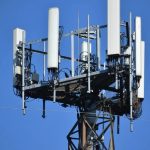
California-based communications service provider Viasat Inc has rejected claims made by Space Exploration Technologies Corporation’s (SpaceX) Starlink satellite internet subsidiary that a semiconductor shortage sits at the heart of Starlink’s inability to service a large number of users. Viasat’s comments were made to the Federal Communications Commission (FCC) in several proceedings which cover a rule debate for the 12GHz spectrum, Starlink’s application to be designated as an eligible telecommunications carrier and the FCC’s Rural Digital Opportunity Fund (RDOF), which has awarded the SpaceX subsidiary close to a billion dollars for providing internet coverage to unserved and underserved Americans.
Starlink Cannot Demonstrate It Has Sufficient Capacity To Meet $886 Million FCC Funding Requirements Says Viasat
As opposed to Starlink, which uses thousands of small internet satellites to provide internet connectivity to select users all over the globe, Viasat uses larger spacecraft for its services. Its opposition to Starlink’s $886 million RDOF win has been consistent since the FCC awarded Starlink the funding late last year.
The amount is distributed over ten years to provide internet coverage to 35 American states. Starlink is not the fund’s biggest recipient, with cable services provider Charter Communications winning a cool $1.2 billion to cover 244 states.
Viasat’s previous criticism of Starlink’s award saw the company turn its guns towards SpaceX chief Mr. Elon Musk. In its FCC submissions, the company claimed that Mr. Musk’s statements on the social media platform Twitter had disqualified his internet service for the RDOF funding since they outlined a risk of Starlink being unable to meet its financial obligations. This potential inability made the internet service a “risky venture” and therefore disqualified the company from the funding outlined Viasat earlier.
The company stated to the Commission that:
In short, while SpaceX apparently was willing to claim a clean bill of financial health in its RDOF applications, Mr. Musk has told a very different story to the public. That story has emphasized the inherently risky nature of the Starlink enterprise. In light of Mr. Musk’s characterization, the Commission can, should, and must conclude that Starlink is the sort of “risky venture” that the Bureaus have concluded should not be funded by the RDOF.

In its latest filing, Viasat builds upon its earlier arguments to include details mentioned by Starlink on its website. These inform visitors that a semiconductor shortage is hampering production and therefore constraining Starlink’s ability to fulfill its pre-orders. Additionally, they also caution that some customers will receive coverage only when capacity is available.
Starlink outlines on its website that:
If you place your order where we have coverage and capacity, you will receive a confirmation email with your order number, service and shipping address, and can view your shipping details on your Account page. We typically ship Starlink Kits out within 2 weeks.
If you are placing an order in an area where we don’t have coverage or capacity, you will see an estimated service date on the order page, which you can also view on your Account page. When service becomes available in your area, we will send you an email and you’ll have the opportunity to update your shipping, service, and billing details, or cancel your order. Orders will be fulfilled on a first-come, first-served basis in each area. We will be able to accommodate more users per area over time as we increase the number of satellites in orbit.
Silicon shortages have delayed production which has impacted our ability to fulfill orders. Please visit your Account page for the most recent estimate on when you can expect your order to be fulfilled.

Viasat rejects Starlink’s claim that a chip shortage is behind the late deliveries, countering that it’s the Starlink system’s under-capacity that lies at the heart of the issue.
In the filing, it states that:
Indeed, press reports indicate that SpaceX has significantly delayed in-service estimates for many areas into early 202311—a delay attributable to inherent limitations of the Starlink system, as opposed to any alleged “chip shortage,” as variance in service availability “is explained by satellite capacity and demand in each region.”
It then turns its guns on Mr. Musk yet again by arguing that the executive is leveraging Starlink’s capacity shortage to entice users to sign up for the service early and, as a result, boost demand. Mr. Musk had tweeted in early October that Starlink can meet its demand capacity quickly in some highly populated areas, and so those wishing the service should sign up quickly to reserve a spot for themselves.
Through Starlink and Musk’s statements, Viasat argues to the Commission that the SpaceX subsidiary is not eligible for the multi-million dollar RDOF award.
The post Viasat Rejects Starlink’s Claim That Chip Shortage Is Delaying Coverage Estimates by Ramish Zafar appeared first on Wccftech.
Powered by WPeMatico





